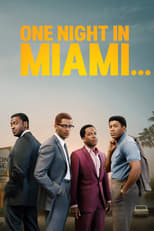Manuel São Bento
Mar 1, 2021
8/10
If you enjoy reading my Spoiler-Free reviews, please follow my blog @
https://www.msbreviews.com
As you know, I always try to know as little as possible about a film before watching it. From skipping trailers to sometimes not even reading the synopsis and going in blind, I firmly believe the best experience one can have is to be surprised by the movie. However, a few films - mainly those "based in real events or real people" - warrant a little pre-research. Before sitting to watch One Night in Miami, I read a little bit about each main character's life to understand who they were, what sort of impact they had in the Black community, and if the night depicted in the movie truly happened. Well, the gathering of these four friends that night is indeed real, but what they really talked about is fictionalized by Kemp Powers' screenplay and Regina King's directorial debut.
Honestly, I'm surprised by how much I enjoyed this film. I didn't have high expectations, but it would still surpass them if I had. It's one of those films anyone will struggle to find major flaws. King blows everyone away with her outstanding directing work, showing incredible control of her craft and deep knowledge of the art of filmmaking. Most of the narrative is spent in a small, cheap motel room. One-location movies are a brutal, challenging task for any director to handle, let alone a debutant, especially when there's no action to create excitement or a significant amount of comedy to entertain the audience. However, King's masterful blocking, framing, and shot composition make every scene feel unique with the help of exquisite cinematography (Tami Reiker) despite the place rarely changing.
These technical attributes may seem insignificant for the general audience, but they're a major reason why this film remains remarkably captivating and refreshing after each conversation. Nevertheless, Powers' screenplay - adapted from his own play of the same name - is as innovative as thought-provoking. Every single dialogue is incredibly worth investing the time to listen carefully. Almost all of the debates and interactions that the main characters have in this movie can be applied to today. This is a great accomplishment script-wise, but it doesn't stop being a bit depressing and sad that important arguments about civil rights make as much sense now as they did almost sixty years ago.
Malcolm X and Sam Cooke are the two characters who argue the most about this topic. On one hand, their discussions can be enlightening about what Black people can do to help their community and change the social-economic system. On the other hand, watching them fight over who has the best formula or who's more successful in using it to help their people is not as pleasant as one might anticipate. Thing is... it's not meant for the viewer to feel comfortable during these talks. The first act is a swift introduction to the ensemble of protagonists - maybe even too fast - but the other two acts are entirely dedicated to these debates precisely to stimulate the audience and make people think and reflect on our society's current state.
Moving on to yet another massive influence on this film's overall success: the ensemble cast. Everyone is absolutely terrific, but my personal standout has to be Kingsley Ben-Adir (The Photograph, King Arthur: Legend of the Sword) as Malcolm X. Kingsley is the one who triggers everything and who keeps bringing the necessary conversations to the screen through an emotionally powerful display. Leslie Odom Jr. (Hamilton, Harriet) follows close behind with a phenomenal, charmful interpretation of Sam Cooke, offering his own beautiful voice to the movie's music (Terence Blanchard). Aldis Hodge (The Invisible Man, Hidden Figures) delivers a grounded yet engaging performance as Jim Brown, while Eli Goree (Race) plays a cocky, overconfident Cassius Clay (later known as Muhammad Ali) who is a bit annoying at first but quickly proves to be much more than that.
I struggled to find explicit, significant flaws throughout the whole film and even after I finished it. Honestly, I believe it's one of those few movies that come out every year where it's tough to really feel disappointed about a specific component. I had my Top10 of the year well-defined, but it will have to open up space for this exceptional film. I hope everyone will come around to watch this one before the Oscars, so it gathers enough support to win a few categories. It would be a shame not to be able to call One Night in Miami an Oscar-winning flick.
Possessing one of the best ensemble casts of the year, One Night in Miami is a magnificent piece of filmmaking and storytelling. From Regina King's masterful directorial debut to Kemp Powers' thought-provoking, mesmerizing adapted screenplay, it's hard to point out flaws in such a well-made movie. King's brilliant blocking and framing maintain every conversation refreshing and unique despite the location rarely changing, while Powers' narrative is packed with arguments about civil rights so impactful that most of them still exist today. Kingsley Ben-Adir and Leslie Odom Jr. have more dialogue to shine than Aldis Hodge and Eli Goree, but all deliver phenomenal performances, especially the first. The first act is a tad too fast yet very entertaining, but the rest of the film is surprisingly captivating until the very end. It might feel heavily depressing at specific moments, but the purpose is precisely to convince audiences to reflect on today's society and its socio-economic system. Personally, I didn't expect it to enter my Top10 of 2020, but here we are...
Rating: A-
